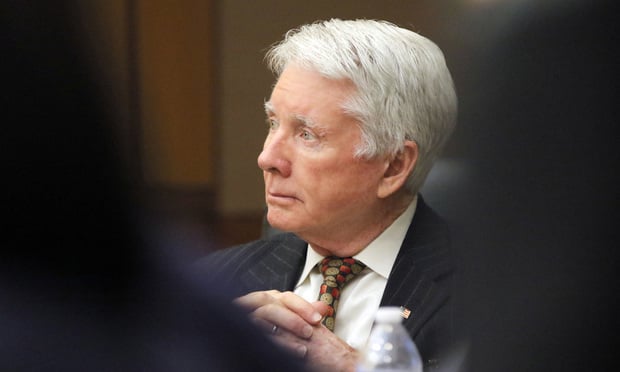Lawyer Argues Tex McIver, Not His Murdered Wife's Estate, Has Right to Sue Over Her Death
An attorney representing the imprisoned former Fisher & Phillips partner asked the Georgia Court of Appeals to dismiss a wrongful death lawsuit against McIver, claiming that he, not his wife's estate, has the right to sue for her wrongful death.
May 16, 2019 at 02:38 PM
5 minute read
 Claud “Tex” McIver during his trial on in April 2018 in Atlanta. (Bob Andres/Atlanta Journal-Constitution via AP, Pool)
Claud “Tex” McIver during his trial on in April 2018 in Atlanta. (Bob Andres/Atlanta Journal-Constitution via AP, Pool)
An attorney representing imprisoned Atlanta lawyer Claud “Tex” McIver argued before the Georgia Court of Appeals Thursday that McIver is entitled to sue for his wife's wrongful death—even if it means suing himself and the star witness against him.
Arguing that a wrongful death suit against McIver should be dismissed, McIver counsel James Scarbrough contended that state law gives McIver, not his wife's estate, the right to sue, even though Tex McIver is serving a life sentence for Diane McIver's murder.
“There is nothing in the [wrongful death] statute to take that right away from him,” argued Scarbrough, a partner at Atlanta's Mabry & McClelland.
“Are you saying he [McIver] is entitled to … call a lawyer into his jail cell and basically bring an action against himself?” Judge Sara Doyle asked.
“He is entitled to bring this action,” Scarbrough replied.
The case is the first time in Georgia that a wrongful death action has been filed against a victim's spouse by the victim's estate, Scarbrough told the court, although he said it isn't the first time that a victim's estate has brought a wrongful death claim against a killer.
Judges Clyde Reese and Todd Markle joined Doyle in hearing oral arguments Thursday.
The wrongful death suit names two people as defendants equally responsible for Diane McIver's death: McIver, a former partner at Atlanta's Fisher & Phillips, and his wife's longtime friend, Dani Jo Carter.
Carter was driving the couple home from a weekend at their 85-acre ranch in September 2016 when McIver shot his wife while sitting behind her in the back seat. Carter, who drove to Emory University Hospital where Diane McIver died, was a star witness at Tex McIver's murder trial.
McIver currently has a motion for a new trial pending before Fulton County Superior Court Chief Judge Robert McBurney. The State Bar of Georgia last year suspended McIver's law license but didn't disbar him.
Scarbrough contended Thursday that Georgia's slayer statute, which bars killers from financially benefiting from their victims' deaths, doesn't prevent McIver from pursuing a wrongful death claim. Instead, Scarbrough insisted the statute only applies to a killer's claims to the victim's assets.
“It doesn't apply here to deprive Mr. McIver of his right to bring a [wrongful death] claim,” he said.
Because McIver, as the surviving spouse, retains the right to sue over his wife's wrongful death, he also retains the option of suing Carter and relying on a jury to apportion responsibility for his wife's death even though he fired the fatal shot, Scarbrough argued.
Scarbrough appealed the case after a DeKalb County State Court judge denied his motion to dismiss it last year.
McIver was removed as executor of his wife's estate after he was charged with his wife's murder. Decatur attorney Mary Margaret Oliver sued McIver and Carter after she was appointed to administer Diane McIver's estate.
Carter's attorney, Lee Davis, said this week that the claim against Carter has no merit and that Carter did nothing wrong.
Atlanta attorney Robin Frazer Clark, who filed the suit on behalf of the estate, told the appellate court that the trial judge ruled correctly that the estate has standing to sue McIver.
Clark argued that Georgia's wrongful death law and the state's slayer statute, which strips killers of any ability to financially benefit from their victims' deaths, should be considered together rather than separately.
Clark contended the slayer statute does apply to litigation stemming from the wrongful death of a homicide victim. She argued that, under the statute, a killer is forced to forfeit all claim to a victim's estate and all rights to any benefits stemming from a wrongful death.
Under the slayer statute, a wrongful death claim must be litigated as if Tex McIver died before his wife, Clark argued.
Georgia law, she added, provides that “under any circumstance where there is a homicide … there will always be some recovery.”
Because the McIvers had no children, and Diane McIver left no surviving parents or siblings to sue over her death, her estate administrator has a legal right to step in, since Tex McIver is legally dead under the statute, Clark said.
Clark also branded as “wrong” Scarbrough's argument that the slayer statute doesn't apply in a wrongful death if the slayer is the victim's husband. Scarbrough's interpretation of the statute would lead to “the absurd result of a wrongdoer having to sue himself to recover for the wrongful death,” she said.
Doyle acknowledged from the bench that the idea that McIver could sue himself “is a strange concept.” But she suggested that the state's wrongful death and slayer statutes might not completely foreclose any claim by a killer husband—who might otherwise have standing to make a wrongful death claim—for his wife's murder.
“I am concerned there is a gap” in the statutes, Doyle said. “There shouldn't be a gap. But there might be a gap.”
This content has been archived. It is available through our partners, LexisNexis® and Bloomberg Law.
To view this content, please continue to their sites.
Not a Lexis Subscriber?
Subscribe Now
Not a Bloomberg Law Subscriber?
Subscribe Now
NOT FOR REPRINT
© 2025 ALM Global, LLC, All Rights Reserved. Request academic re-use from www.copyright.com. All other uses, submit a request to [email protected]. For more information visit Asset & Logo Licensing.
You Might Like
View All
Law Firms Expand Scope of Immigration Expertise Amid Blitz of Trump Orders
6 minute read
Bass Berry & Sims Relocates to Nashville Office Designed to Encourage Collaboration, Inclusion
4 minute read
Gunderson Dettmer Opens Atlanta Office With 3 Partners From Morris Manning
3 minute read
Trending Stories
- 1Uber Files RICO Suit Against Plaintiff-Side Firms Alleging Fraudulent Injury Claims
- 2The Law Firm Disrupted: Scrutinizing the Elephant More Than the Mouse
- 3Inherent Diminished Value Damages Unavailable to 3rd-Party Claimants, Court Says
- 4Pa. Defense Firm Sued by Client Over Ex-Eagles Player's $43.5M Med Mal Win
- 5Losses Mount at Morris Manning, but Departing Ex-Chair Stays Bullish About His Old Firm's Future
Who Got The Work
J. Brugh Lower of Gibbons has entered an appearance for industrial equipment supplier Devco Corporation in a pending trademark infringement lawsuit. The suit, accusing the defendant of selling knock-off Graco products, was filed Dec. 18 in New Jersey District Court by Rivkin Radler on behalf of Graco Inc. and Graco Minnesota. The case, assigned to U.S. District Judge Zahid N. Quraishi, is 3:24-cv-11294, Graco Inc. et al v. Devco Corporation.
Who Got The Work
Rebecca Maller-Stein and Kent A. Yalowitz of Arnold & Porter Kaye Scholer have entered their appearances for Hanaco Venture Capital and its executives, Lior Prosor and David Frankel, in a pending securities lawsuit. The action, filed on Dec. 24 in New York Southern District Court by Zell, Aron & Co. on behalf of Goldeneye Advisors, accuses the defendants of negligently and fraudulently managing the plaintiff's $1 million investment. The case, assigned to U.S. District Judge Vernon S. Broderick, is 1:24-cv-09918, Goldeneye Advisors, LLC v. Hanaco Venture Capital, Ltd. et al.
Who Got The Work
Attorneys from A&O Shearman has stepped in as defense counsel for Toronto-Dominion Bank and other defendants in a pending securities class action. The suit, filed Dec. 11 in New York Southern District Court by Bleichmar Fonti & Auld, accuses the defendants of concealing the bank's 'pervasive' deficiencies in regards to its compliance with the Bank Secrecy Act and the quality of its anti-money laundering controls. The case, assigned to U.S. District Judge Arun Subramanian, is 1:24-cv-09445, Gonzalez v. The Toronto-Dominion Bank et al.
Who Got The Work
Crown Castle International, a Pennsylvania company providing shared communications infrastructure, has turned to Luke D. Wolf of Gordon Rees Scully Mansukhani to fend off a pending breach-of-contract lawsuit. The court action, filed Nov. 25 in Michigan Eastern District Court by Hooper Hathaway PC on behalf of The Town Residences LLC, accuses Crown Castle of failing to transfer approximately $30,000 in utility payments from T-Mobile in breach of a roof-top lease and assignment agreement. The case, assigned to U.S. District Judge Susan K. Declercq, is 2:24-cv-13131, The Town Residences LLC v. T-Mobile US, Inc. et al.
Who Got The Work
Wilfred P. Coronato and Daniel M. Schwartz of McCarter & English have stepped in as defense counsel to Electrolux Home Products Inc. in a pending product liability lawsuit. The court action, filed Nov. 26 in New York Eastern District Court by Poulos Lopiccolo PC and Nagel Rice LLP on behalf of David Stern, alleges that the defendant's refrigerators’ drawers and shelving repeatedly break and fall apart within months after purchase. The case, assigned to U.S. District Judge Joan M. Azrack, is 2:24-cv-08204, Stern v. Electrolux Home Products, Inc.
Featured Firms
Law Offices of Gary Martin Hays & Associates, P.C.
(470) 294-1674
Law Offices of Mark E. Salomone
(857) 444-6468
Smith & Hassler
(713) 739-1250






